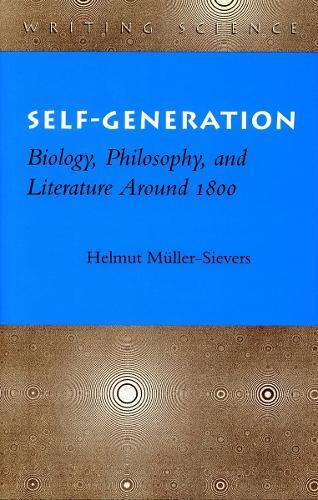Overview
The genealogy and function of epigenesis the theory that organisms generate themselves under the guidance of a formative drive provides a unique means of understanding the profound changes in philosophy, philosophy of language, and literature at the turn of the nineteenth century. The book begins by describing how and why epigenesis came to replace the reigning model of biological origination, preformation the theory that all organisms were preformed at the creation of the world. Contemporary with these developments, Kant used the figures of epigenesis and self-formation to illustrate his concepts of the origin of the categories, the possible success of practical reason, and the validity of aesthetic and teleological judgments. The author shows how Kant's figurative use of self-generation was turned into an indispensable determination by Fichte and his successors: philosophical knowledge can claim absolute certainty only if it can prove that it generates itself in logically accountable procedures.
Full Product Details
Author: Helmut Müller-Sievers
Publisher: Stanford University Press
Imprint: Stanford University Press
Edition: New edition
Dimensions:
Width: 15.20cm
, Height: 1.80cm
, Length: 22.90cm
Weight: 0.445kg
ISBN: 9780804727792
ISBN 10: 0804727791
Pages: 277
Publication Date: 01 April 1997
Audience:
College/higher education
,
Professional and scholarly
,
Undergraduate
,
Postgraduate, Research & Scholarly
Format: Hardback
Publisher's Status: Active
Availability: In Print

This item will be ordered in for you from one of our suppliers. Upon receipt, we will promptly dispatch it out to you. For in store availability, please contact us.
Reviews
This very important book provides a rare insight into the background conditions of philosophical and literary production in the eighteenth and nineteenth centuries by examining the debate in biology between preformation theory and epigenesis. The chief significance of Muller-Sievers' study lies in demonstrating that the victory of epigenesis shaped theory formation in philosophy (Kant, Fichte), language acquisition (Herder, Humboldt), and literature (Goethe, Beaumarchais). -Eckart Forster, University of Munich
This very important book provides a rare insight into the background conditions of philosophical and literary production in the eighteenth and nineteenth centuries by examining the debate in biology between preformation theory and epigenesis. The chief significance of Muller-Sievers' study lies in demonstrating that the victory of epigenesis shaped theory formation in philosophy (Kant, Fichte), language acquisition (Herder, Humboldt), and literature (Goethe, Beaumarchais). - Eckart Forster, University of Munich
Author Information
Helmut Müller-Sievers is Associate Professor of German and Comparative Literary Studies at Northwestern University. He is the author of Epigenesis: Naturphilosophie im Sprachdenken Wilhelm von Humboldts.



